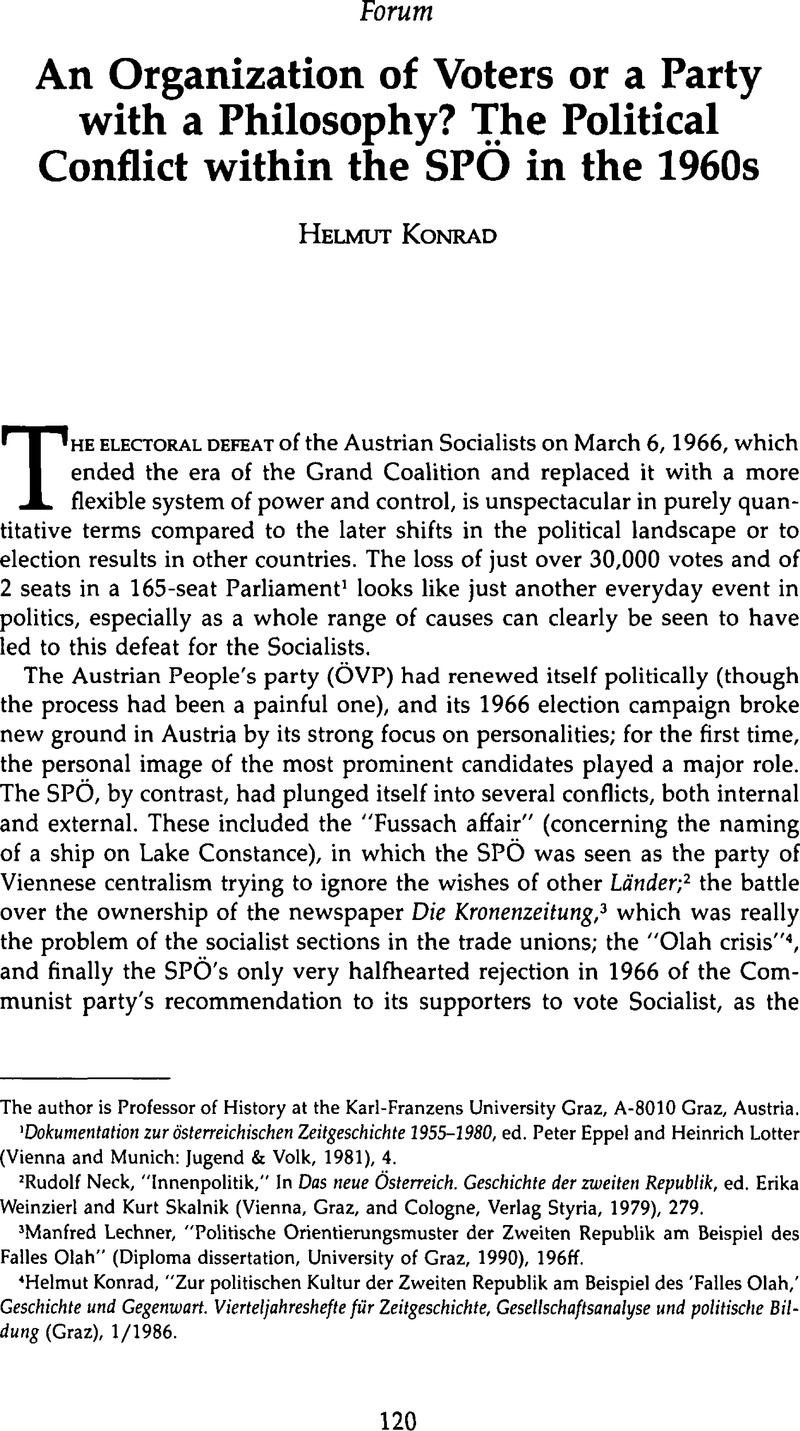No CrossRef data available.
Article contents
An Organization of Voters or a Party with a Philosophy? The Political Conflict within the SPÖ in the 1960s
Published online by Cambridge University Press: 10 February 2009
Abstract

- Type
- Forum: The Austrian Socialist Party Since 1945
- Information
- Copyright
- Copyright © Center for Austrian Studies, University of Minnesota 1992
References
1 Dokumentation zur österreichischen Zeitgeschichte 1955–1980, ed. Eppel, Peter and Lotter, Heinrich (Vienna and Munich: Jugend & Volk, 1981), 4Google Scholar.
2 Neck, Rudolf, “Innenpolitik,” In Das neue Österreich. Geschichte der zweiten Republik, ed. Weinzierl, Erika and Skalnik, Kurt (Vienna, Graz, and Cologne, Verlag Styria, 1979), 279Google Scholar.
3 Lechner, Manfred, “Politische Orientierungsmuster der Zweiten Republik am Beispiel des Falles Olah” (Diploma dissertation, University of Graz, 1990), 196ffGoogle Scholar.
4 Konrad, Helmut, “Zur politischen Kultur der Zweiten Republik am Beispiel des ‘Falles Olah’, Geschichte und Gegenwart. Vierteljahreshefte für Zeitgeschichte, Gesellschaftsanalyse und politische Bil-dung (Graz), 01/1986Google Scholar.
5 Eppel and Lotter, eds., Dokumentation, 28.
6 Weber, Fritz, Der Kalte Krieg in der SPÖ. Koalitionswächter, Pragmatiker und revolutionāre Sozialisten (Vienna, 1986)Google Scholar.
7 Konrad, “Zur politischen Kultur,” 34.
8 American Federationist. Official Monthly Magazine of the American Federation of Labor 55 (December 1948): 15.
9 Report of Proceedings of the Sixty-Seventh Convention of the American Federation of Labor, held at Cincinnati, Ohio, November 15–22, 1948, 248ff.
10 Windmuller, John P., “American Labor's Role in the International Labor Movement 1945–1950” (Thesis, Cornell University, 1951), 68Google Scholar.
11 Svoboda, Wilhelm, Franz Olah. Eine Spurensicherung (Vienna, 1990), 34ffGoogle Scholar.
12 Report of Proceedings, 284.
13 See Svoboda, Franz Olah, 24 and his note 5, 134.
14 Lechner, “Politische Orientierungsmuster,” 111ff.
15 Deposition in his own defense by Olah, from the 1969 trial. It was not permitted to be read aloud in court, but is appended to the court documents. All the material is at present in a private collection of papers relating to Olah in the Department of Contemporary History, Historical Institute, University of Graz. Quotation from page 5 of Olah's deposition.
16 Ibid., 5.
17 Restitutionsfonds der Freien Gewerkschaften gegen Franz Olah, December 20, 1965. Private collection relating to Olah; see my note 5.
18 All documents relating to the history of the financing of the Kronenzeitung, including copies of the passbooks to the mortgaged bank accounts and all credit agreements, are in the private collection mentioned in note 15. A book on the subject by Helmut Konrad and Manfred Lechner is in preparation.
19 Confidential information to Federal Minister Probst of October 28, 1964 (see my note 15).
20 Settlement between the disputing parties, November 7, 1969. Private collection (see my note 15).
21 See Konrad, Helmut, “Karl R. Stadler,” in Arbeiterschaft und Nationalsozialismus, ed. Ardelt, Rudolf and Hautmann, Hans (Vienna: Europa Verlag, 1989)Google Scholar.
22 A study of anti-Semitism in Austrian Social Democracy from the beginning to the present day would be a rewarding undertaking.
23 Eppel and Lotter, eds., Dokumentation, 479ff.
24 Stadler, Karl R., Adolf Schärf. Mensch, Politiker, Staatsmann (Vienna: Europa Verlag, 1982), 475ffGoogle Scholar.
25 Olah's personal deposition in his defense, (see my note 15), 10.
26 Pelinka, Anton, Windstille. Klagen über Österreich (Vienna and Munich, 1985), 46fGoogle Scholar.
27 Konrad, “Zur Politische Kultur,” 40f.
28 Evidence given by Fritz Klenner at the preliminary hearings in the trial of Franz Olah, September 1966. Transcript, 11. Private collection (see my note 15).
29 Olah's personal deposition in his defense (see my note 15), 23f.
30 Eppel and Lotter, eds., Dokumentation, 61.
31 Czernetz, Karl, “Führungsprobleme in einer Demokratie,” Die Zukunft (Vienna) 5 (1964): 4Google Scholar. Broda, Christian, “Die Sozialistische Partei ist keine ‘Führer’-Partei,” Die Zukunft (Vienna) 7 (1964): 21Google Scholar.
32 Olah's personal deposition in his defense (see my note 15), 29.
33 Lechner, “Politische Orientierungsmuster,” 90.
34 Czernetz, “Führungsprobleme,” 4.
35 Klenner, Fritz, Die österreichischen Gewerkschaften. Vergangenheit und Gegenvartsprobleme (Vienna: Verlag des Österreichischen Gewerkschaftsbundes, 1979), 3:2452Google Scholar.
36 Minutes of the meeting of representatives of the Socialist party in the Land of Lower Austria on September 18, 1964. Christian Broda Archive, section on Ministry of Justice and juridical policy 1959–1966, file II, 142.9. Quoted by Lechner (see my note 3), 88.
37 Judgment of the District Criminal Court, Vienna, on March 28, 1969. Private collection (see my note 15 above).
38 Thus most recently Pleschberger, Werner, “Die ‘Olah-Krise’: Politische Probleme der Modernisierung des österreichischen Parteiensystems in den sechziger Jahren.” In Das österreichische Parteiensystem, ed. Pelinka, Anton and Plasser, Fritz (Vienna, Cologne, and Graz, 1988), 708fGoogle Scholar.


